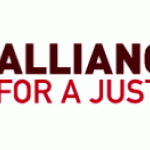Labor Coalition Calls for Minimum Wage Higher Than $15 Per Hour
https://portside.org/2015-10-13/labor-coalition-calls-minimum-wage-higher-15-hour

Portside Date:
Author: Ned Resnikoff
Date of source:
Al Jazeera

As the nationwide campaign for a $15 hourly minimum
wage gains traction, some labor groups have set their
sights on an even higher number: $16.87 — a demand that
could help push the $15 figure closer to the mainstream
of American politics.
A new report, published Tuesday, from the Alliance for
a Just Society, a coalition of labor organizations,
argues that $15 an hour is less than a living wage in
most states. A single, childless adult earning $15 per
hour would still not be able to make ends meet in 34
states and the District of Columbia, Alliance for a
Just Society researcher Allyson Fredericksen found.
She estimated that the true nationwide living wage for
a single adult — based on a weighted average of wages
in each state — is $16.87 per hour. At the low end of
the spectrum, the report found Arkansas to have a
living wage of $14.26 an hour; D.C. was had the highest
living wage, $21.86 an hour.
The estimates in this report are significantly higher
than those of the frequently cited MIT Living Wage
Calculator, largely because of Fredericksen’s more
expansive assumptions regarding what workers need as a
minimum living standard. (MIT assumed that a studio
apartment is the minimum housing requirement for a
single adult, for example, while Fredericksen assumed a
one-bedroom.)
But the alliance’s demand for a $16.87 minimum may
serve a political purpose, by positioning $15 as a
compromise.
While unimaginable in most parts of the country until a
few years ago, $15 minimum wage legislation has spread
across the country. In 2013, SeaTac, Washington, became
the first city in the nation to approve a law gradually
raising its minimum wage to $15 per hour; Seattle
followed in 2014.
Various other cities have stepped up since then,
including Los Angeles and San Francisco. New York Gov.
Andrew Cuomo is pushing for the first statewide $15
minimum legislation.
Meanwhile, two 2016 Democratic presidential candidates
— Martin O’Malley and Bernie Sanders — have endorsed a
federal $15 minimum wage, though front-runner Hillary
Clinton has not.
The alliance’s report arrives the same day that the
Democratic presidential candidates will hold their
first televised debate. Clinton, who has spent much of
her campaign courting labor groups, is likely to face
pressure from O’Malley and Sanders over her lack of
support for a nationwide $15 minimum wage.
Alliance for a Just Society’s backers include Working
Washington, one of the groups that campaigned for a $15
wage in Seattle, and Restaurant Opportunities Center
United, which supported Cuomo’s efforts to institute a
$15 minimum wage for New York fast-food workers.
Activists demanding $15 an hour have successfully
pressured the White House and congressional Democrats
to raise the bar on their minimum wage proposals — not
quite to $15 but from $10.10 to $12.
Opponents of a federal $15 minimum wage often argue
that it would have the unintended consequence of
reducing employment. Former White House economic
adviser Alan Krueger wrote in a Sunday New York Times
opinion piece that although “some high-wage cities and
states could probably absorb a $15-an-hour minimum wage
with little or no job loss, it is far from clear that
the same could be said for every state, city and town
in the United States.”
A hike to $12 an hour, on the other hand, “would do
more good than harm for low-wage workers,” he wrote.
David Cooper, an analyst for the labor-friendly
Economic Policy Institute, told Al Jazeera that raising
the minimum wage to $15 or beyond might be difficult to
implement because, in inflation-adjusted terms, it has
been allowed to decline so far from its 1968 peak. But
there are other ways to raise wages at the low end of
the economic ladder, he said. In particular, he
highlighted the apparent pay-boosting effects of giving
workers more power in setting their own compensation.
“The minimum wage is really a substitute for the lack
of bargaining power among low-wage workers,” he said.
“If we could increase unionization rates for those
workers, then increasing the minimum wage wouldn’t be
as necessary."
Boosting unionization rates is also among the
recommendations included in the Alliance for a Just
Society reportA
